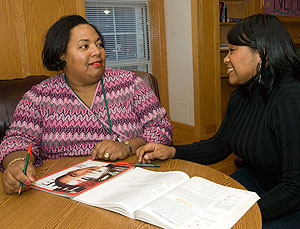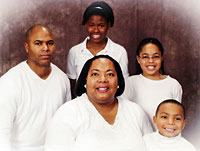When Washington University students get called to Tamara King’s office on the South 40, it’s as often as not like being summoned to the principal’s office back in high school. Something’s wrong, and there’s a price to be paid.

But King, J.D., who was a lawyer and an assistant district attorney in Pennsylvania before coming to WUSTL in 1999 as director of judicial programs, says it’s just this challenge that keeps her coming to work each day.
Whatever the case is before her — academic integrity or behavioral conduct — King’s constant mantra is fairness, and her desire is to perform a balancing act between protecting the University’s interests and educating students about inappropriate behavior and what they can do to learn from their mistakes.
So now she’s a lawyer not really working as a lawyer but nonetheless working to shepherd justice. So what’s it take to do her job? A sense of humor is a good place to start, she says.
“You cannot work as closely as I do with students on very difficult issues and not have a sense of humor,” says the 45-year-old who grew up in Easton, Pa., on the border of Pennsylvania and New Jersey, 85 miles from New York City and 55 miles north of Philadelphia. “We’re dealing with negative behavior all the time, so I always approach it believing there’s got to be a silver lining somewhere in this dark cloud that looms over a student’s head.
“But I also am a strong believer in treating the student, no matter what they’ve done, with the utmost respect,” she says. “I need to be able to say to a student, ‘You’re not a bad person, you just made a bad decision, and here’s what that decision is going to cost.'”
King’s colleagues and supervisors echo and confirm that her approach to disciplinary action is working and making WUSTL a better, more caring environment for all students.
“What makes Tamara extremely valuable is that she understands the context of the work she’s doing and that it’s a critical part of our community and to a young person’s coming of age,” says James E. McLeod, vice chancellor for students and dean of the College of Arts & Sciences. “She understands young people and has the capacity to be both firm and understanding in very difficult circumstances.”
Her immediate supervisor, Justin Carroll, concurs.
“Tamara is a no-nonsense straight-shooter when dealing with students, and they respect her for that,” says Carroll, associate vice chancellor and dean of students. “She has a very difficult job dealing with a part of undergraduate life that is never talked about. One of Tamara’s most important responsibilities is communicating to students the principles that are important to being a member of our community.
“Sometimes, young people fall short of our expectations. During the past 10 years, Tamara has helped countless students learn what it means to be a responsible citizen of our community. She is tough but very fair,” Carroll says.
A life ‘full of firsts’
Growing up in a small town, King always knew she wanted to go to college and do well, which was not necessarily the expectations for much of the African-American population in her community, she says. In her high-school graduating class of 625 students, there were only two African-American women — and no African-American males — who went to college right out of high school. Those expectations were set high at home.
“There was never a question about ‘if you go to college,'” she says. “It was always, ‘when you go to college.’ I always say my life is full of firsts. In that town, I was the one who, in their eyes, succeeded, did well, went to college, became a lawyer.”

As a Penn State undergraduate in the early 1980s, King says she endured racism in the rural setting of State College, Pa. From being treated negatively by white cafeteria workers to all-too-common blackface minstrel shows and racist Halloween masks, she knew it wasn’t safe to venture more than 10 miles outside of the university campus. But those experiences helped build her character and spurred an interest in the law and politics.
She went to New York University for law school and then returned home to see how she could best help her community. She established a successful law practice and served on local boards and committees. Eventually, she came to the attention of her county’s district attorney and became the first African-American ever hired in the district attorney’s office in its 200-year history.
“The DA said, ‘Tamara, I need you on my staff. I need women. I need people of color. You’re well credentialed, and everyone I’ve talked to speaks highly of you.’ And I said, ‘We’ll try this.’ So, that was a big first. That was big news back then,” says King, who went on to serve as assistant district attorney for six years.
Perfect fit at WUSTL
She moved to St. Louis when she married her husband, Michael, who was from the region. After years of a grueling schedule in the district attorney’s office, she was ready for something a little different — an opportunity to make a difference in a new way and also start a family. She felt herself being drawn to a career in higher education and to WUSTL.
She first applied for a job as an assistant dean in University College. Dean Robert Wiltenburg, Ph.D., interviewed her but didn’t think she was quite right for the job. But he did think she might be a perfect fit for another job available at the time — her current position.
“And that’s how I ended up here,” King says. “I always credit him for me ending up at the University.”
Over her nearly 10 years in higher education judicial affairs, King has become heavily involved in the training and development of individuals who do what she does at other institutions, even though a small percentage of them have backgrounds in law.
|
Tamara King |
|
Education: : B.A., political science, 1985, Penn State University; J.D., 1988, New York University School of Law Family: Lives in Fairview Heights, Ill., with her husband, Michael, and children Chloe, 16, Chelse, 8, and Michael, Jr. (called KJ for “King Jr.”), 5 When she’s not working: She’s a typical busy mom, taking the kids to myriad activities, including Girl Scouts, basketball, soccer, t-ball, roller and ice skating and swimming lessons. Advice to her children:“You have to decide what quality of life you want to have, and, based on that, you need to do the right things to get you there,” she says. If she didn’t work at WUSTL:“I would start a nonprofit organization focused on providing life skills for underserved populations. I think it is a person’s ability, drive and motivation that gets them to where they are,” she says. |
This month, she will become the first African-American to serve as president of the Association for Student Judicial Affairs, an international organization that helps to promote, encourage and support student development professionals who have responsibility for student judicial affairs. It’s a crucial organization for these people, she says.
“When you’re on a campus where there’s only one person responsible for student conduct, it’s nice to have colleagues all over the country with whom you can pick up the phone and say, ‘Hey, we’re having this situation, and I know your institution dealt with it as well. How did you guys handle it?'” says King, who has watched the association grow over the past 10 years to approximately 1,700 members representing about 850 institutions across the world.
Shepherding students
King considers herself a true partner in the educational mission of the University, often encouraging students to seek the help they need to get where they want to be, including counseling and alcohol education. And there have been experiences with students that make the tough times worth the occasional pain, she says.
She tells the story of a student who was terrified that his parents were going to remove him from the University following a behavioral issue and a disciplinary action. So she bet him a case of soda that, after she called his parents, he would still be in school.
As she anticipated, the case got resolved. And, after taking some time away from campus, the student returned and still comes by to visit her, sometimes with a 12-pack of Diet 7UP in hand.
“He’s come full circle,” she says.
Whether she’s dealing with a particularly tough judicial case, advising the Black Pre-Law Society or meeting with her four-year advisees or prelaw students, King continues to be “blown away” by the students with whom she works.
“They’re talented, they’re smart, they’re passionate,” she says. “It’s just amazing to be around young people who are so dynamic. So, I enjoy what I do because I feel like, in the end, I can make a huge difference in someone’s life.”